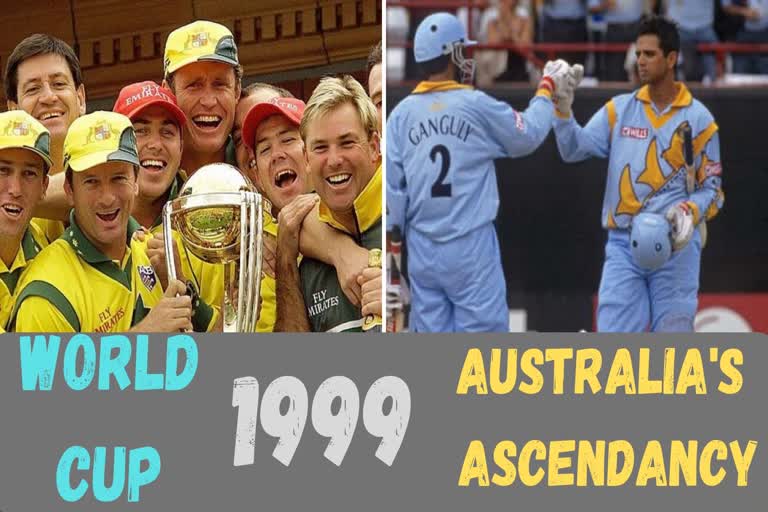Hyderabad: In 1999, England was hosting the World Cup after 16 years. The last time when the tournament was played in England, India scripted history winning their maiden World Cup title. After a tragic semifinal exit in the 1996 World Cup, Indians all around the world once again hoping for a good show from their favourite stars. But the 1999 World Cup is better known for individual brilliance than team efforts, with the Indian team finishing the tournament contributing the maximum number of centurions in the event. While Rahul Dravid scored two, Sachin Tendulkar, Sourav Ganguly and Ajay Jadeja scored one century each.
In the 1999 edition of the global event, Australia won the World Cup for the second time. On the other hand, shocking defeats to South Africa, Zimbabwe and New Zealand paved way India's exit from the tournament.
Here are the key moments of India's 1999 ICC Cricket World Cup campaign.
Group Stage
Early hiccups
India started their campaign with a four-wicket defeat to South Africa, one of the favourites of the tournament. Sourav Ganguly (97) and Rahul Dravid (54) helped India to post 253 for 5. Lance Klusener picked up 3 wickets. Jacques Kallis' 96 powered South Africa to a four-wicket win. Though South Africa won the fixture, the match was marred by earpiece controversy involving captain Hansie Cronje and fast bowler Allan Donald.
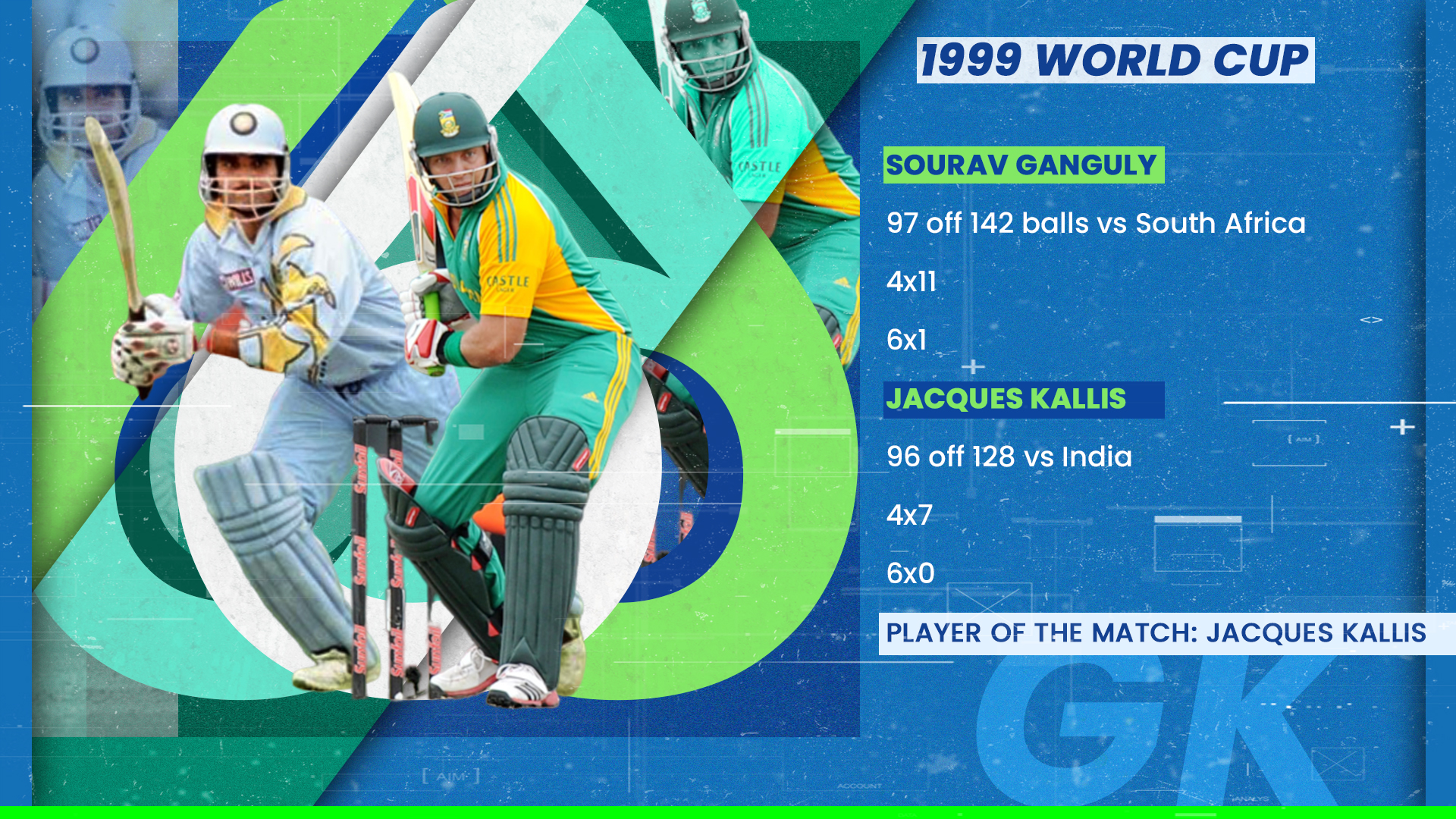
In their second match, Zimbabwe imposed an upset defeat on India beating them by 3 runs in a nail-biting match at Leicester. A lower-order batting collapse left India reeling to defeat from the jaws of victory.
Back to back defeats shook India's morale.
Men in Blue bounced back
With an early exit imminent, India made a comeback in the tournament beating Kenya in their third match. The match saw Sachin Tendulkar, who just returned from home after performing his father's last rites, hitting 140 not out. Rahul Dravid too scored unbeaten 104. India set a massive 330 runs target for Kenya, who, in reply, could only manage to score 235 for 7 in 50 overs. India won the match by 94 runs.
Run-feast vs Sri Lanka
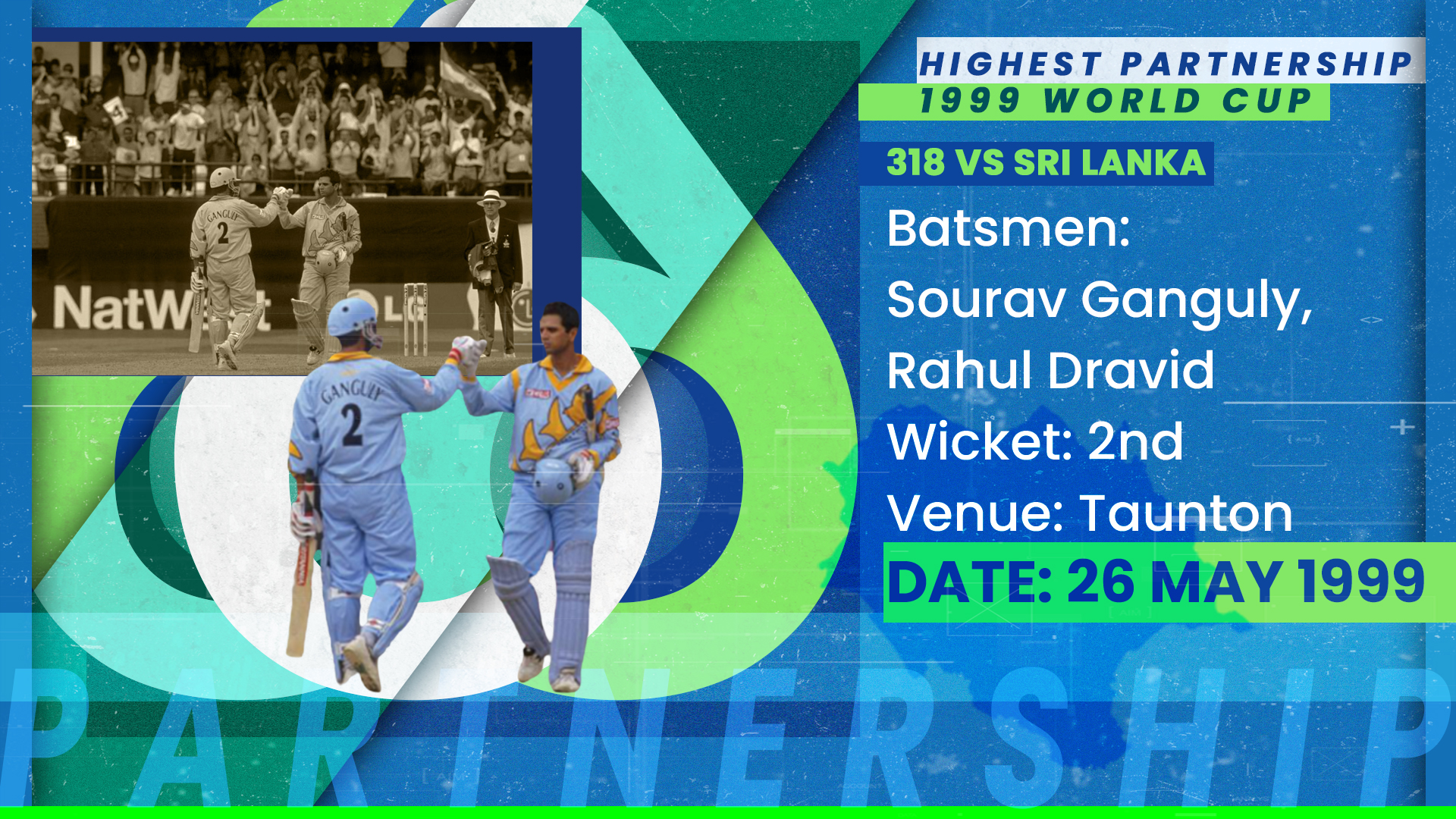
India regained their confidence with a thumping victory over Kenya. But the best was yet to come. On May 26 when India took on the defending champions Sri Lanka at Taunton an epic was scripted. The match brought the best out of the Indian team. After an early blow, Sourav Ganguly and Rahul Dravid battered Sri Lankan bowlers on their way to building 318 runs second wicket partnership, which was the highest partnership for any wicket then. When Dravid,145, was dismissed India had already scored 324 runs.
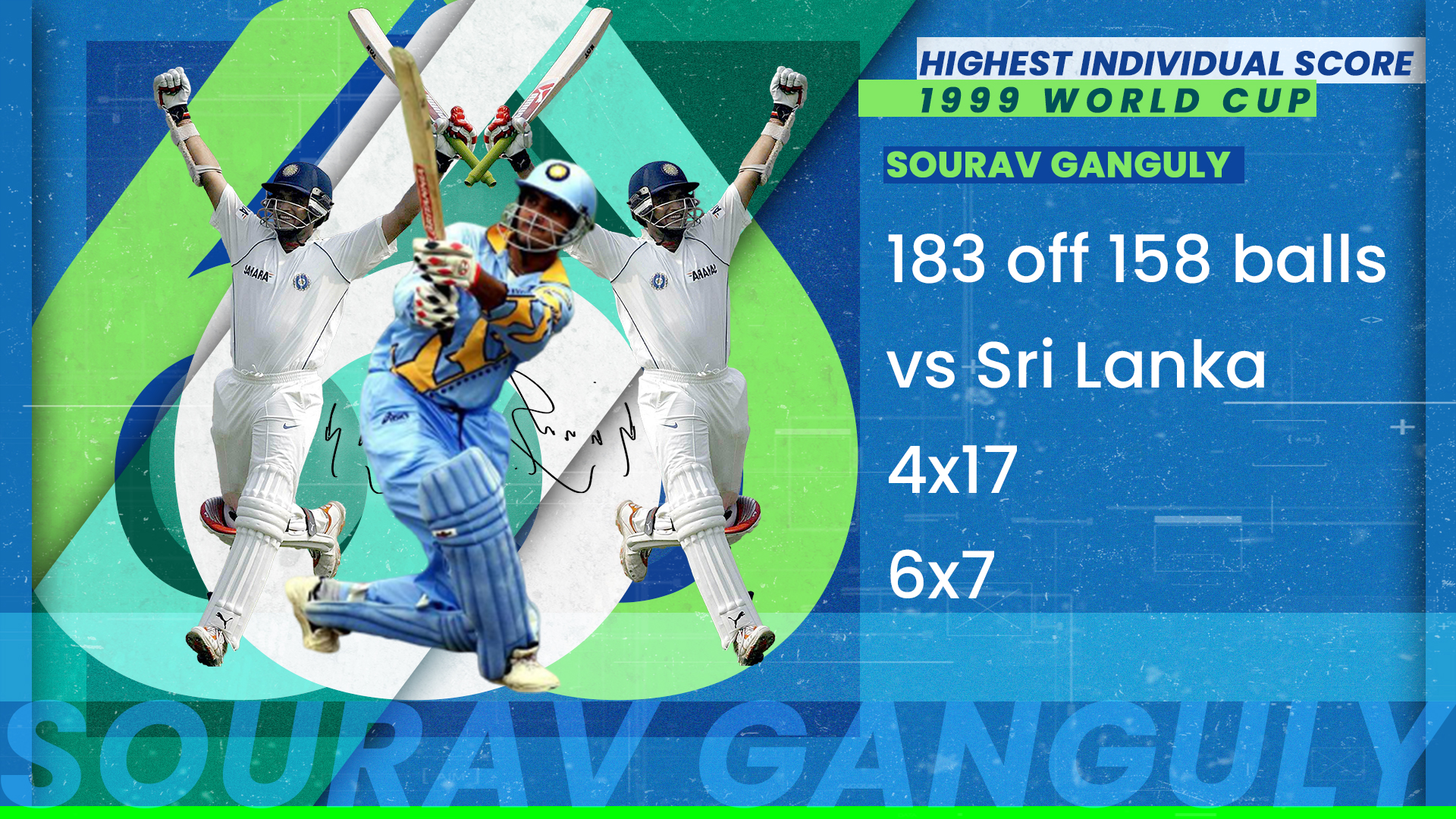
The hero of the match was Sourav Ganguly who slammed 183 off 158 balls with the help of 17 boundaries and 7 sixes. Ganguly's 183 was the highest score of the 1999 World Cup. It now stands at the fourth spot in the list of highest individual scores in World Cup history.
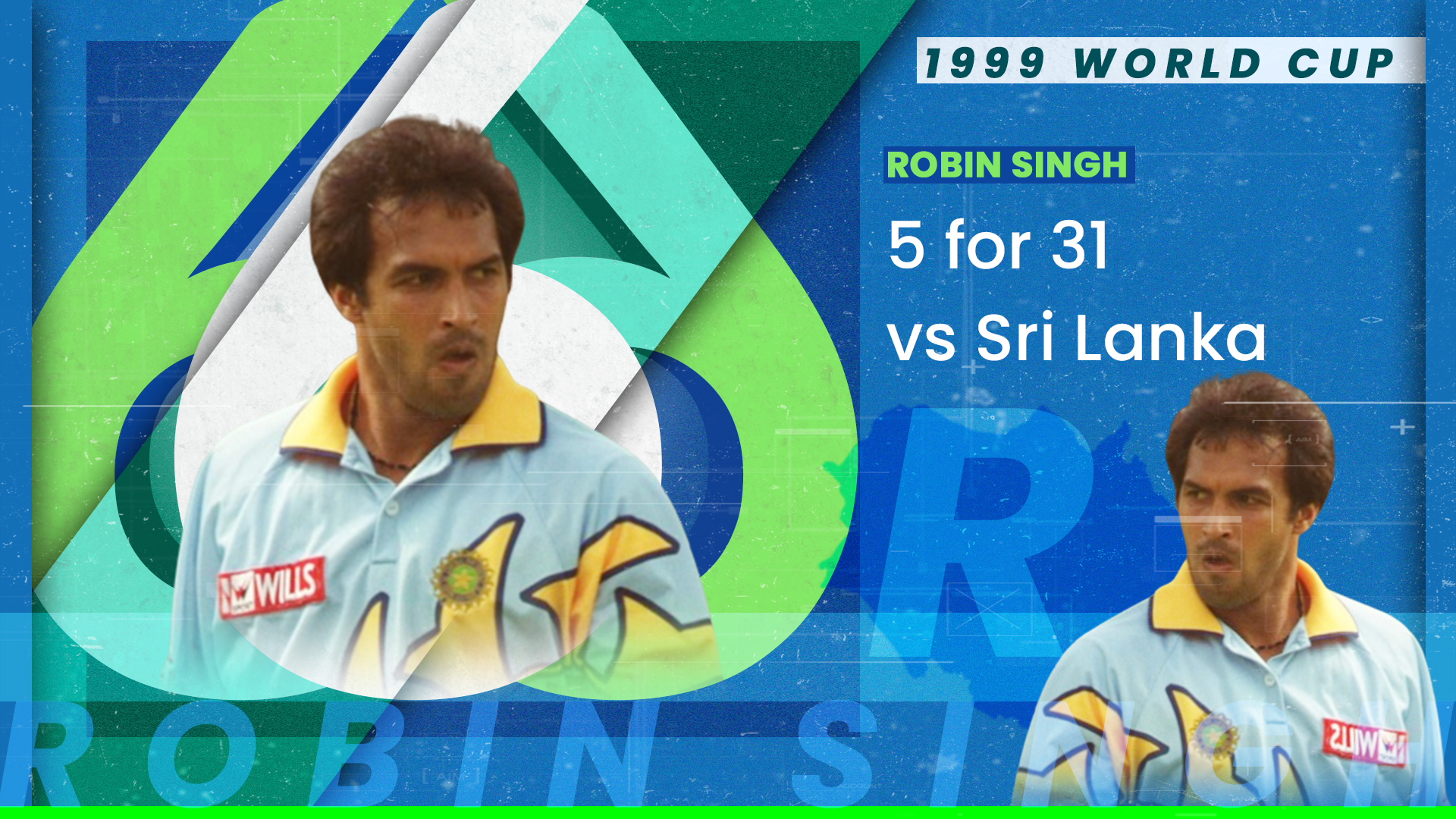
Robin Singh picked up 5 wickets giving away 31 runs as Sri Lanka were bowled out for 216. India won the match by 157 runs.
Knocked hosts England out
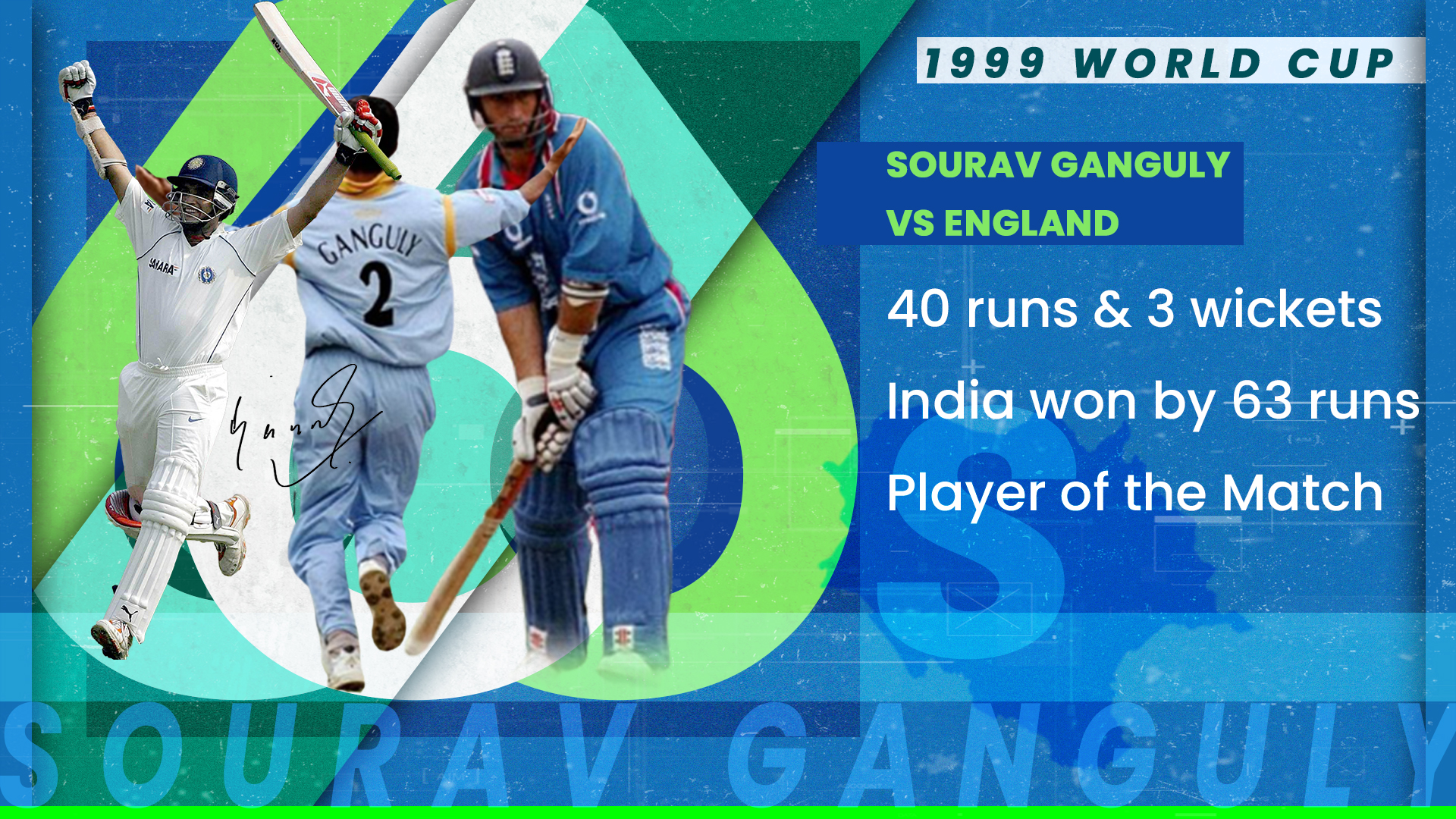
Fresh off two successive convincing wins, India were scheduled to take on hosts England on May 29 at Edgbaston. Men in Blue were looking to seal their place in the Super Sixes by knocking England out of the Cup.
Batting first India could manage to post modest 231 for 8 in stipulated 50 overs. Dravid top-scored for India, with 53 while Ganguly scored 40 runs. Though it was not a big total, Indian bowlers defended it successfully as they bundled England out for 169 in a rain-marred match that saw India progressing to the Super Six. Ganguly was adjudged Man of the Match for taking 3 wickets in addition to scoring 40 runs.
India won the match by 63 runs.
Super Six
Super Six was a new concept in the Cricket World Cup. In this format, the top three teams from each group will qualify for the Super Six carrying with them the points they had earned against two teams who had also qualified from their group. They then would play qualifying teams from the other group, creating a final all-played-all league table, with the top four advancing to the semifinals.
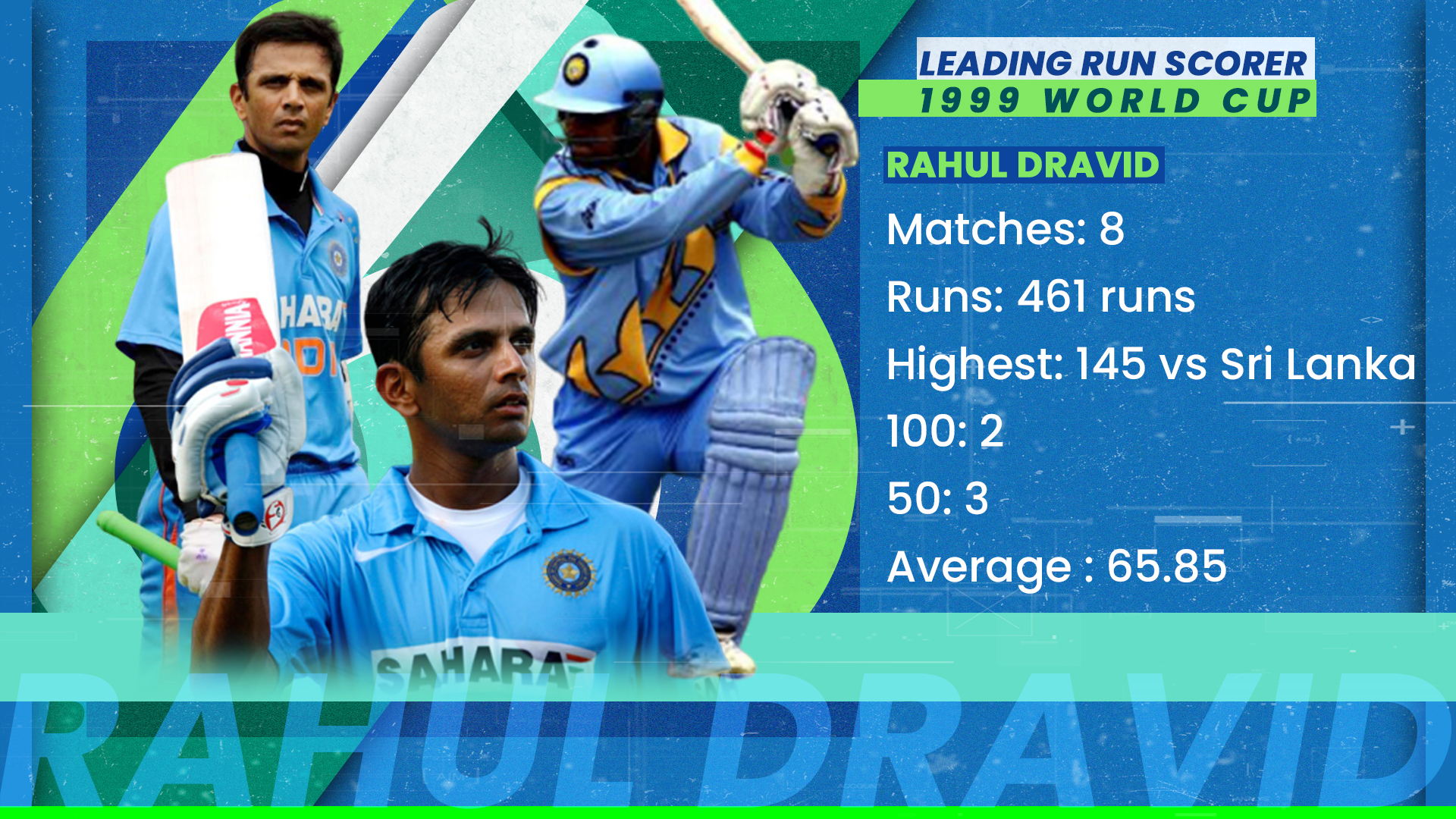
Since India lost their Group A matches against South Africa and Zimbabwe they started on the back foot. In the first Super, they faced Australia and suffered 77 runs defeat at the Oval.
Beat archrivals Pakistan
After a poor performance against Australia, India were in a do-or-die situation. In their second Super, they confronted Pakistan in Manchester. This was the third time both teams were facing each other in the World Cups. In the previous two occasions, India defeated Pakistan by 43 runs and 39 runs respectively.
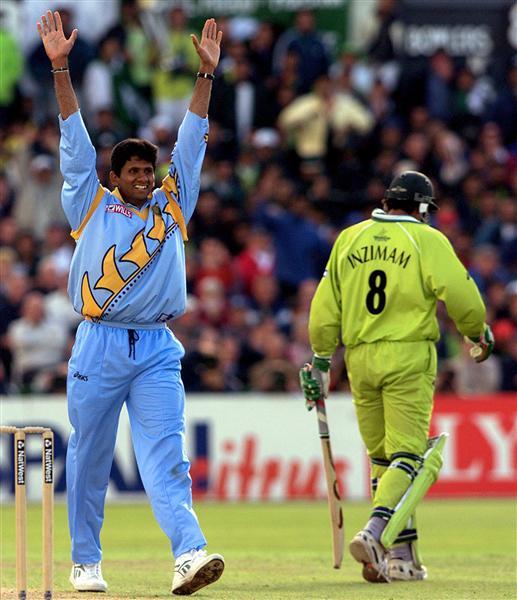
The match was played in the backdrop of Kargil war so the atmosphere was so intense. India winning the toss decided to bat first. In a rain-hit match, India had posted 227 for 6 on the board. Dravid scored 61 while captain Mohammad Azharuddin played a 59-run knock. Tendulkar also contributed to the team total scoring 45.
Pakistan's reply was not good as Venkatesh Prasad rattled them picking up 5 wickets for 27 runs. Javagal Srinath took 3 wickets while Anil Kumble scalped 2. Pakistan were bowled out for 180. They lost the match by 47, their third consecutive defeat against India in the World Cups.
Way out of the World Cup
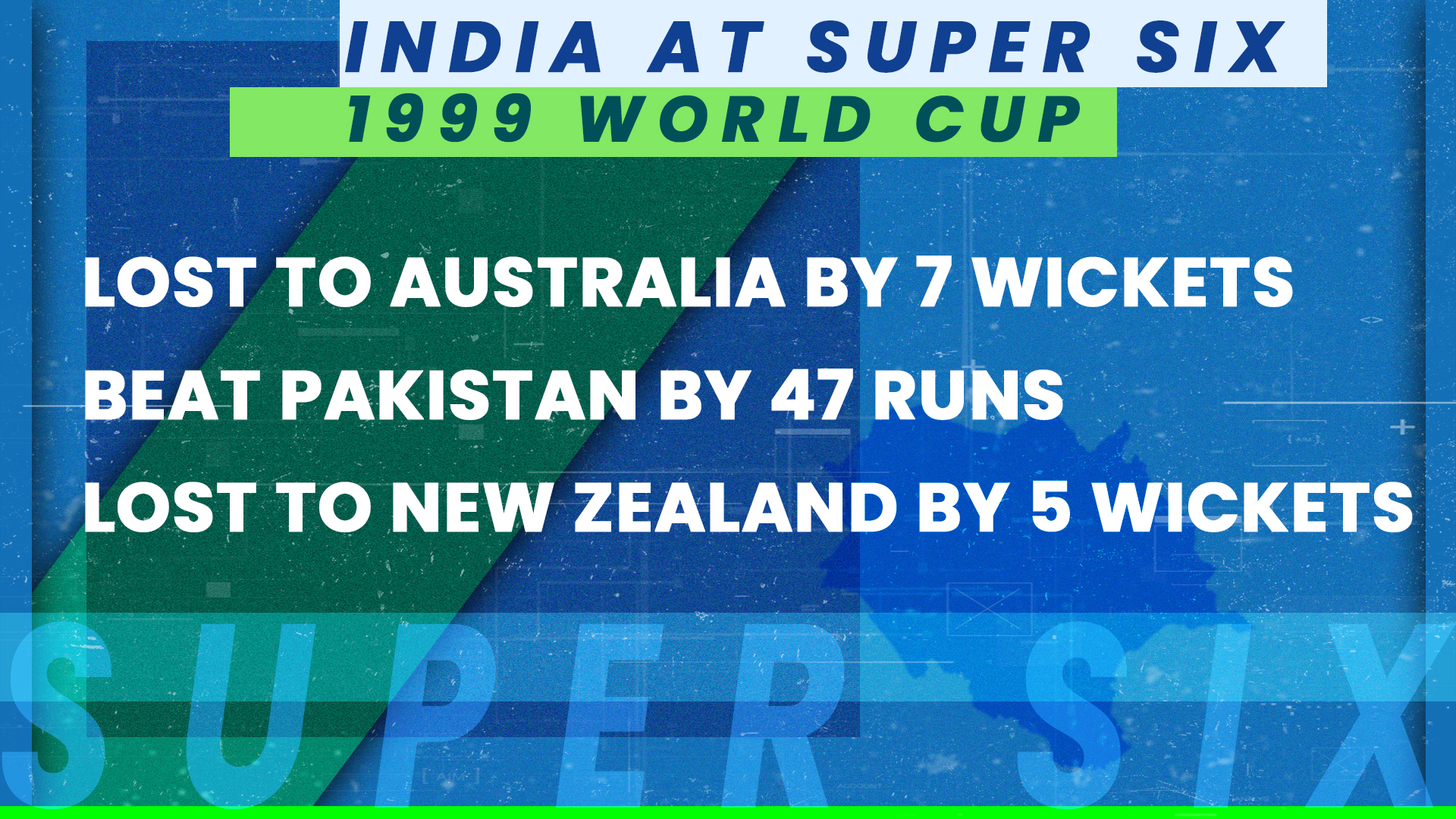
However, after a mood-lifting win against Pakistan, India suffered defeat to New Zealand in their third and final Super Six match that crashed them out of the 1999 World Cup. Batting first India had set a modest 252 runs target for the Kiwis. Ajay Jadeja top-scored for India, with 76. New Zealand, in reply, won the match by 5 wickets riding on half-centuries by Matt Horne (74) and Roger Twose (60).
Semifinals
With this win, New Zealand qualified for the semifinals. They faced Pakistan and suffered a huge 9-wicket loss. In the second semifinal, Australia and South Africa played out a draw, but the formers advanced to the final due to a superior net run rate.
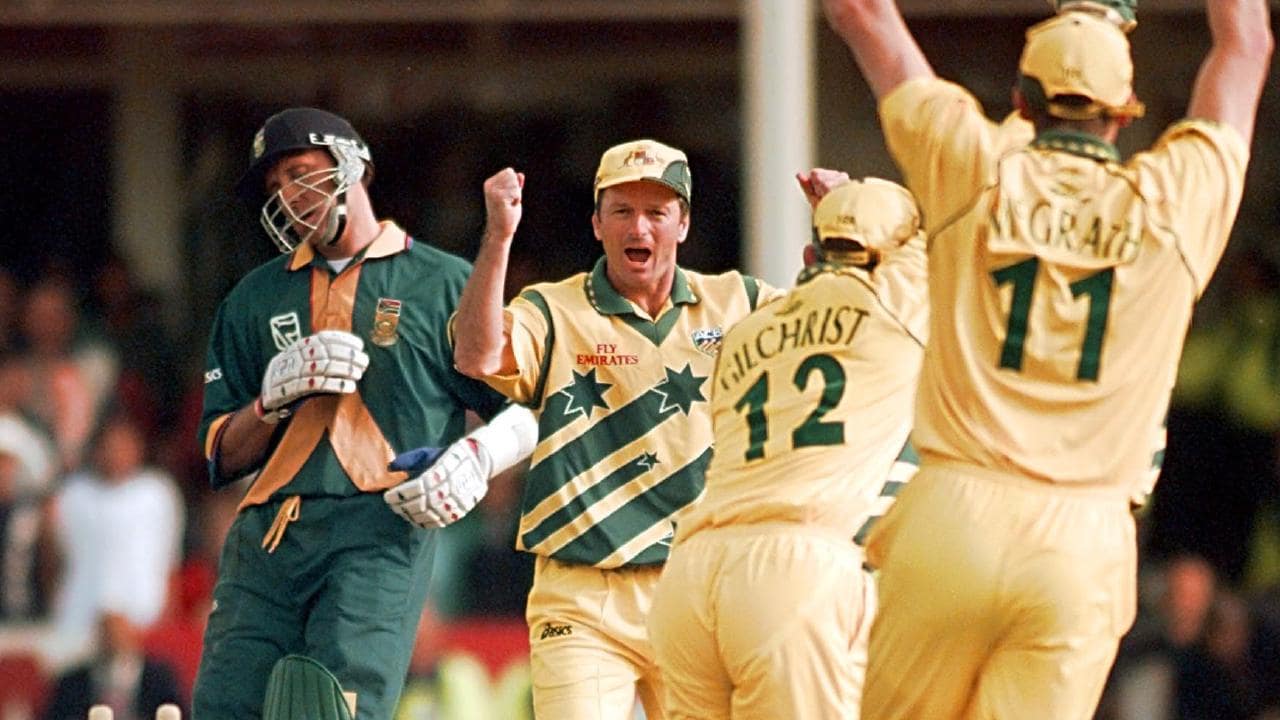
The second semifinal saw a tragic end to South Africa all-rounder Lance Klusener's campaign as an infamous run-out cost his side a place in the World Cup Final in 1999.
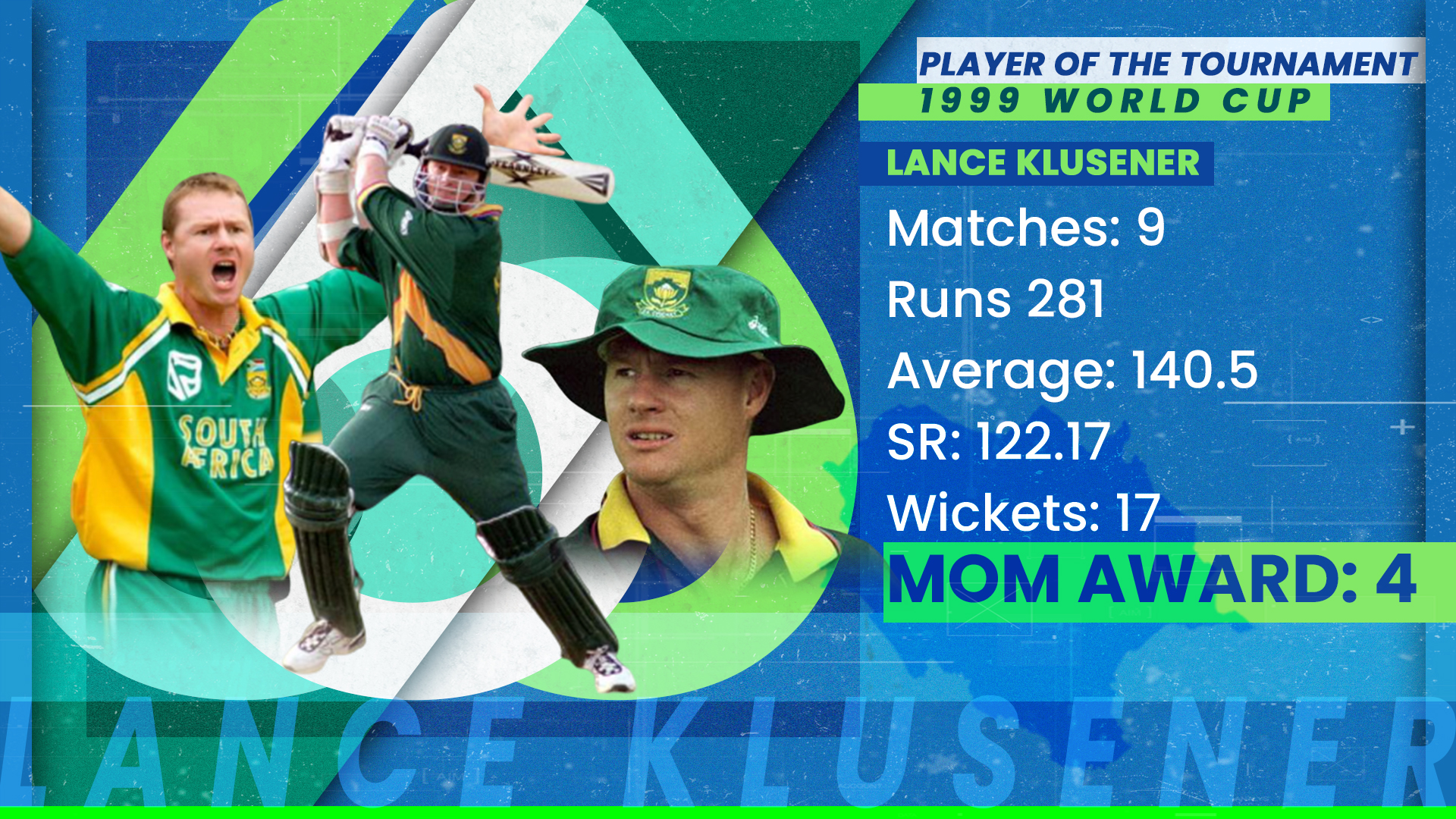
Klusener performed brilliantly throughout the tournament. He amassed 281 runs at an astounding average of 140.50 and took 17 wickets, highest by a South African bowler. He won the Player of the Tournament award but couldn't touch the World Cup trophy.
The Final 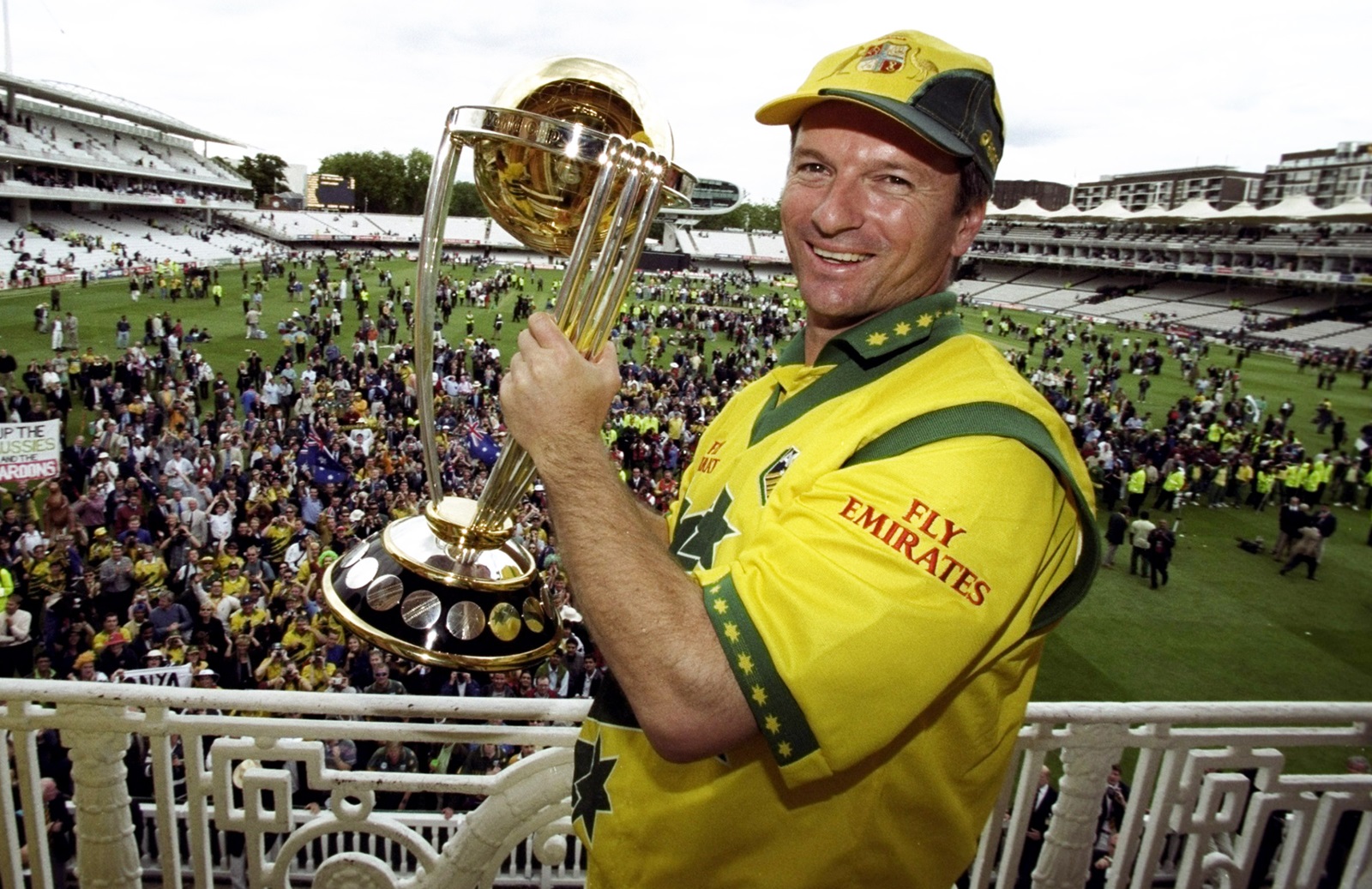 Steve Waugh with the World Cup trophy
Steve Waugh with the World Cup trophy

The final was played between Australia and Pakistan at the Lord's on June 20. A good contest was expected since both teams were boasted of quality players, but it turned out to be a lopsided affair with Pakistan being bowled out for 132 and Australia chasing down the target in just 20.1 overs with 8 wickets in hand. In 1999 World Cup, Steve Waugh led Australia was boasted of talent in all departments, with the likes of captain Steve Waugh, Adam Gilchrist, Ricky Ponting, Shane Warne and Glenn McGrath – amongst others – wearing their famous green and gold at the tournament to win their second World Cup title.
